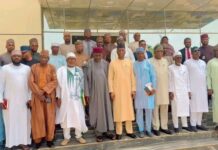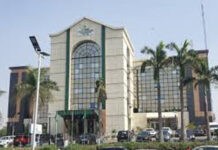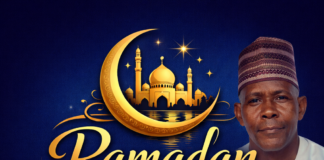All praise is due to Allah, Lord of all creation. May the peace and blessings of Allah be upon the Messenger, his family, his Companions and those who follow him till the Hour is established.
Dear brothers and sisters, the fourth pillar of Islam is fasting (in Arabic: Siyam or Saum). And it is to fast throughout the month of Ramadan (the ninth month of the Islamic calendar). This is an act of worship that draws the Muslim closer to Allah, as the Qur’an stated:
“Fasting has been prescribed upon you as it was prescribed upon those who came before you so that you may attain piety.” [Qur’an, 2:183]
In this month the Muslim pushes himself physically and spiritually in order to come closer to Allah.
Fasting and spirituality means that every Muslim should: 1. Focus on getting closer to Allah. 2. Study and recite the Qur’an plentifully. 3. Improve obedience to Allah. 4. Give in charity. 5. Pray the night prayers. 6. Show kindness and generosity. 7. Seek forgiveness for sins.
In Muslim countries, life continues as normal but cafes, restaurants and work-place canteens close during the day because no one is eating or drinking. A Muslim takes a pre-dawn meal as the Prophet Muhammad (Peace be upon him) commanded before the morning prayer. Throughout this month people spend more time in reading the Qur’an and remembering Allah with words of praise and glorification (Zikr). Hundreds of millions of Muslims look forward to Ramadan each year.
At dusk (sunset) everything changes. The Muslim begins by breaking the fast with some dates and water. He then prays the Maghrib prayer (after the sun has set), after which he returns to his family to share in a well-prepared meal. Even at this stage, a Muslim is commanded not to go to excess in filling his belly. The Muslims should eat food they love that is wholesome and in moderation. Within two hours the Muslim returns to the Mosque and prays the late prayer (Isha) followed by quite a lengthy night prayer for which there is a huge reward from Allah. But in this year’s Ramadan all these will not take place due to the Covid-19 restrictions. Muslims as usual will continue with their usual Ramadan Activities namely Ramadan Tafsir and lectures, which will be online for now due to the lockdown. We must listen to, obey and follow our leaders in all that is good for us.
Fasting is not obligatory upon everyone. Some people are exempt, such as children under the age of puberty who have not yet reached adulthood. Some adults are also exempt due to their particular situation: 1. Travelers upon a journey. 2. The sick who are likely to recover. 3. Menstruating women.
4. Postnatal bleeding women.
These people are allowed to miss days but must make them up later after Ramadan once they are able. There is yet another group of people who are exempted: Those who are terminally sick; the elderly who cannot fast due to their old age; pregnant and breastfeeding women who fear for their babies if they were to fast.
These people must feed a poor person for each day missed since they are not expected to make up what they have missed. Ramadan is known as the month of the Qur’an because it was during this month that the Qur’an was first revealed, and continued to be revealed by Allah to the Angel Jibril (Gabriel) who would bring verses to the Prophet Muhammad (Peace be upon him) as and when events requiring guidance happened over the next twenty three years, until his death. Allah stated in the Qur’an:
“The month of Ramadan is that in which was revealed the Qur’an, a guidance for the people and clear proofs of guidance and a criterion between truth and falsehood. So whoever sights the new moon of the month, let him fast it; and whoever is ill or on a journey – then an equal number of other days must be made up. Allah intends for you ease and does not intend for you hardship and wants for you to complete the period and to glorify Allah for that to which He has guided you; and perhaps you will be grateful.” [Qur’an, 2:185]
Many want to change their lives for the better, so Ramadan gives them an ideal opportunity. They cease boyfriend/girlfriend relationships; they stop bad habits such as lying, stealing, backbiting, smoking, drinking, listening to music, watching movies and so on.
A lot of Muslims fall short in their behaviour throughout the year, but they know that Ramadan is a month of forgiveness and mercy, so they obey Allah and the Prophet Muhammad (Peace be upon him) and do good deeds, with the desire to carry on after Ramadan in the same manner. They seek Allah’s Mercy and Forgiveness daily.
They try to understand the message of the Qur’an by sitting with knowledgeable teachers who will teach them from classical works thus avoiding misguided and dangerous ideologies. Muslims must always protect themselves from being led to extremes and from falling into neglect of established religious practices.
In Ramadan, the Muslim communities become stronger, people show mercy to each other, by being kind and generous, especially to one’s parents and family.
Ramadan makes Muslims reflect upon the bounties of Allah such as life, happiness, security, food, drink, health, family, wealth and so on. When Muslims go hungry and thirsty, they begin to understand the plight of those who are poor and needy and so they give thanks to Allah for His kindness and grace upon them.
Muslims help those less fortunate than themselves. They feel sympathy for the poor and so they give in charity, thereby receiving more reward from Allah.
Ramadan teaches the Muslims self-control and reminds them that serving Allah must take priority over their own desires.
Devout Muslims exert themselves harder in prayer, recitation and glorification of Allah especially in the last ten nights of Ramadan because in these nights there is the “Night of Power and Decree” (called Lailatul-Qadr) which is better than a thousand months of worship. The Muslims were taught by the Prophet Muhammad (Peace be upon him) to seek out the beginning of Ramadan by looking out for the new moon of the month. It is not correct to use pre-determined calculations for the beginning and end of Ramadan since that opposes the instruction of the Prophet Muhammad (Peace be upon him). In fact he said:
“When you see it (the crescent moon) fast, and when you see it again cease fasting, and if there is cloud-cover then complete thirty days.”
Finally, non-Muslims should know that Muslims worship only one Allah, the Lord of all creation – He is the Allah of Prophets Nuh (Noah), Ibrahim (Abraham), Musa (Moses), Isa (Jesus), Muhammad and all the Prophets (Peace be upon them all).
All praise is due to Allah, Lord of the worlds. May the peace, blessings and salutations of Allah be upon our noble Messenger, Muhammad, and upon his family, his Companions and his true followers.
Murtadha Muhammad Gusau is the Chief Imam of Nagazi-Uvete Jumu’ah and the late Alhaji Abdur-Rahman Okene’s Mosques, Okene, Kogi State, Nigeria. He can be reached via: gusauimam@gmail.com or +2348038289761.




















